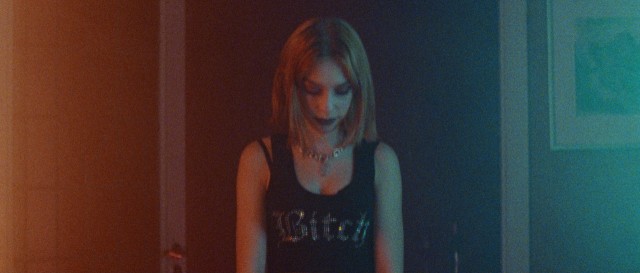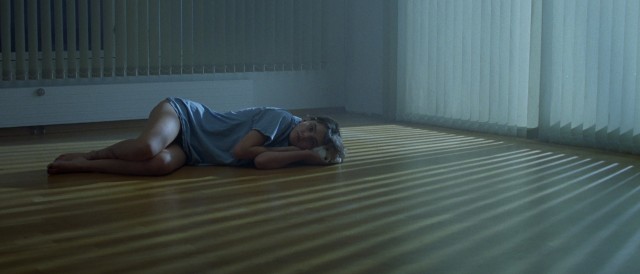Already a two-time alum of Short of the Week – with her films Satan’s Barn and Virgins4Lyfe – Norwegian filmmaker Thea Hvistendahl returns to our site with Cramps, a thought-provoking exploration of a female experience not often seen on screen. It may be 2021, but there are many topics not widely discussed among women, including what it actually feels like to have an abortion, let alone the mental trauma that comes along with it. Colorful and deeply personal, Cramps is an eye-opening film that will offer a much-needed perspective into the female psyche.
“I wanted it to be some kind of mystery”
Full of lush visuals, Cramps balances the pain of a teenage girl’s trauma with the dreaminess of memories from a young romance at a party. Shot on both 35mm and 16mm film, to divide the timelines, Hvistendahl’s approach is stylish and poetic, setting up the narrative in a way that doesn’t overtly say what the film is about. Told through nonlinear flashbacks and fantastical sequences, Hvistendahl leaves her audience to piece together the story for themselves. “I guess I wanted it to be some kind of mystery. Because to be honest, the plot isn’t what it’s about. It’s about understanding how she in a way neglects also what she has been through and that this might create a trauma in her,” Hvistendahl tells Short of the Week.
Inspired by the stories of friends, that went through abortions at a young age, Hvistendahl was interested in how these women were able to cope, let alone grasp the gravity of the situation as young as they were. While she wanted to describe the nuances and emotional ramifications of such a difficult experience, Hvistendahl first and foremost sought to illustrate the pain that actually arises when a woman undergoes a medical abortion. Not enough people realize that the pills induce painful contractions, which surprisingly isn’t often spoken of among women. “And to be honest, I discovered that in my thirties,” Hvistendahl reveals. “So it’s not meant as a film for or against abortion, but a film that tries to describe the different feelings that occur and how one doesn’t really understand what’s going on with ones body.”

Sofie Steffensen in Thea Hvistendahl’s Cramps
While I haven’t experienced an abortion or miscarriage myself, Cramps is such a deeply personal and visceral film that I wanted to hear from fellow female Short of the Week programmers Céline and Serafima about it. Here’s an abridged version of our discussion:
Chelsea – In looking at the work that we’ve featured of Thea’s, she has this wonderful ability to capture the female experience and doesn’t shy away from showing some of the more challenging moments young women face. Cramps is no different – teens having to handle pregnancy and thus the pain of abortion on their own – it has always been in the periphery of the public sphere, but Thea shows us an ugly side to it while managing to be poetic. I was surprised by the juxtaposition of Thea’s delicate visual aesthetic. What did you both think?
Serafilma – I love that Cramps has the aesthetic of a fashion film but there’s also depth and heart in the narrative, making it quite a unique film to experience. And I say experience because you don’t simply ‘watch’ this film, you feel it with every cell of your body.
Céline – There is a deeply moving poetic element in the visual flair that complements the two timelines. The party has an almost fantasy feel to it while the scene where she is alone is surprisingly effective in capturing the nuances of her experience, without overdramatizing it.
Chelsea – As Serafima said, you absolutely feel this film, especially the pain that this girl is experiencing in the first few scenes of it. But, even more than that, I love how detached the character becomes, almost as if we are experiencing her confused defense mechanisms coming into place, working to protect her young mind from understanding the gravity of the situation. For a coming of age narrative like this, you can see why she’d choose to make some of those montages almost feel like a horror film, much like her previous short, Satan’s Barn. But as Serafima says, it plays much more like a fashion film and has a real feminine edge to it.
Céline – Oh totally, no man could have made this film! It is way too authentic in its emotional engagement, that’s why we all felt what she was going through. You might not relate, but the film makes it impossible not to empathize with her.
Serafima – It also feels very much like it’s been conjured up straight from the mind of a teenage girl
Chelsea – I couldn’t agree more – I felt her loss in my bones. I wonder if male audiences will fully understand it
Céline – There is something very medical to abortions, it is a medical procedure after all. We are used to seeing the emotional repercussions on screen, but the actual physical side effects, including cramps, are rarely shown. And I thought that she addressed that side of the experience very well. Genre is sometimes the best way to accurately capture a narrative that has both an emotional and a physical layer.

“I felt those cramps watching the film” – S/W programmer Serafima found the film a physical experience.
Chelsea – As soon as she was alone on the floor, my gut just knew what this film was going to be about.
Céline – There is no way around it, it is rough and we feel it. Compartmentalizing is her coping mechanism, and that also impacts the viewing experience while demystifying that experience.
Serafima – Oh yeah, I felt those cramps watching the film haha
Chelsea – SAME. So do you think that this film offers more clarity to those who may not understand what women have to go through? (and mostly alone)
Céline – Both the physical and emotional impact of the experience are present throughout the film, and both enhance the other which I think is a pretty good depiction of what is going through her head. The packed visuals to me captured all that inner turmoil and confusion, grasping and processing the event while trying to distract yourself.
Serafima – I really don’t know. I certainly hope so.
Chelsea – Me too. This film absolutely stuck with me for days.
Céline – I think the film is very successful in conveying the experience of this girl, but it comes down to the viewer and their (his!) ability to process what they are seeing.
Chelsea – Well I think all of us know at least one person who has had a miscarriage or an abortion and it’s a tough thing to grasp. I think Thea’s narrative opens up a conversation that I’d like to see more in the public sphere.
Serafima – I found it extremely relatable and compelling, even though it’s not something I’ve personally experienced myself. But I agree it’s down to the viewer and how open and perceptible they are to other people’s pain – be it emotional or physical.
Céline – It’s exceptionally relatable like you said Serafima, but the more experimental approach allows the story to have a more psychological and lasting impact. It captures what can’t be written in dialogue or precisely and effectively conveyed through a performance.
Serafima – Especially if told through the words of a teenager – who aren’t exactly well known for being articulate
Céline – Abortions and miscarriages are a part of life, well women’s life… It is rarely tackled in such a realistic way, it’s usually used as a twist in a narrative.. So definitely a mandatory watch.
Chelsea – I think we can all agree that Cramps is a must-watch? Like required reading?
Serafima – Absolutely.
Chelsea – Yes!! So, the takeaway here? Go watch this short people!!
Serafima – Like now!
Winner Of Gnist Prize at The Norwegian Short Film Festival 2020, Honorable Mention at Kristiansand International Children’s Film Festival 2021, and an official selection at Vienna Shorts 2021, Cramps is a film we’re proud to premiere on S/W. Hvistendahl is currently working on her debut feature, Handling The Undead and will shoot spring of 2022.

 Chelsea Lupkin
Chelsea Lupkin